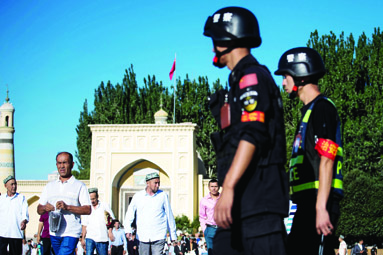BEIJING: Chinese authorities have launched a campaign against halal products in the name of fighting extremism in the capital of Xinjiang, the fractious northwest region where Muslims are facing a raft of religious restrictions. Beijing has in recent years launched a security crackdown in Xinjiang against what it calls separatist elements, and a UN report has cited estimates that up to one million ethnic Uighurs and other Muslim minorities are held in extrajudicial, political reeducation camps.
Halal - Arabic for "permissible" - refers to a set of rules guiding Muslims on what is allowed according to the religion. It is frequently applied to food and drinks but also includes other personal hygiene products like toothpaste and cosmetics. Authorities in Xinjiang have long seen the expansion of the term to include non-food items as a sign of religious extremism. Communist Party leaders in Urumqi, the regional capital, on Monday led cadres in swearing an oath to fight the "pan-halal trend to the end".
In an article posted on the city's official WeChat social media account, party cadres were told to post the same oath on their social media accounts, which included disowning religion. "My belief is Marxism-Leninism... I must fly the flag high and battle (the) 'pan-halal trend' to the end, resolute in my beliefs, even to death!" the oath reads. Government officials should also not have dietary restrictions, the statement said, adding work canteens would be changed so officials can try "cuisines of various nationalities".
As part of the campaign, Urumqi's ethnically Uighur head prosecutor Ilshat Osman also wrote an essay titled: "Friend, you do not have to find a halal restaurant specially for me". The state-run Global Times tabloid yesterday cited "experts" as saying that the "pan-halal" tendency blurs the boundary between religion and secular life, making it easy to "fall into the mire of religious extremism". China launched its "Strike Hard" campaign targeting separatism in Xinjiang in 2014 following deadly violence in the region.
Uighurs and other Muslim minorities are subject to strict regulations banning beards and burqas, and many have been detained in reeducation camps for offences as minor as making contact with family members outside the country or sharing Islamic holiday greetings on social media, a UN report said in August.
Meanwhile, anti-terror efforts in controversial "reeducation centers" in the Xinjiang region will be governed by new standardized rules, as international criticism mounts over the detention of as many one million in the restive far west. The revised rules, passed Tuesday, call on local governments to tackle terrorism by establishing "vocational education centers" that will carry out the "educational transformation of people who have been influenced by extremism".
The centers should teach Mandarin Chinese, legal concepts and vocational training, and carry out "thought education", according to a copy of the rules posted on the regional government's website. A previous version of the rules issued in March 2017 included a long list of prohibitions on religious behavior including wearing long beards and veils. It also encouraged local governments to engage in "educational transformation", a term critics have described as a euphemism for brainwashing.
The detentions have mostly focused on the region's Muslim minorities, especially the Uighurs, a Turkic ethnic group that make up around half of Xinjiang's population of 22 million. The new regulations seem aimed at standardizing the centers' management, which was initially carried out piecemeal. Beijing has denied reports of the mass detention of its citizens in camps but evidence is mounting in the form of government documents and testimonies from former detainees.
Chinese authorities have, however, said that they give vocational and language training to people guilty of minor crimes. Testimony from people who have escaped the centers provides a much darker picture, however. In July, a former teacher at one of the centers told a court in Kazakhstan that "in China they call it a political camp but really it was a prison in the mountains". "Xinjiang's political education centers remain arbitrary and abusive, and no tweaks in national or regional rules can change that," said Maya Wang, senior China researcher at Human Rights Watch. - Agencies










